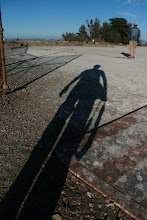 It's taken me a while to get around to thinking up a review for March of the Zapotec/Holland, the latest double-EP from Beirut; mainly because I've been playing the hell out of a vinyl copy of Gulag Orkestar that I just got a hold of. A bit ironic, but I'm sort of glad I listened to the debut album before giving a proper listen to March of the Zapotec/Holland, just because it gave me a new and interesting perspective on both the two albums and the feel of Beirut's music as a whole.
It's taken me a while to get around to thinking up a review for March of the Zapotec/Holland, the latest double-EP from Beirut; mainly because I've been playing the hell out of a vinyl copy of Gulag Orkestar that I just got a hold of. A bit ironic, but I'm sort of glad I listened to the debut album before giving a proper listen to March of the Zapotec/Holland, just because it gave me a new and interesting perspective on both the two albums and the feel of Beirut's music as a whole.When I first listened to Gulag Orkestar, I got the impression that Zach Condon (originally the only member of Beirut, now the leader) was a true international; someone who embodied and cherished the Balkan culture that he was performing with. A man without nationality, if you will. Listening to Gulag again, though, I realize this was very shortsighted of me. Rather than sounding like a native, Condon's vocals overlay the sounds of distant lands like a genuinely curious traveler. Someone who is interested in the culture, wanting to infuse himself with his new surroundings, but ultimately someone who will leave and take what he has learned back with him.
This newfound take on Beirut's music was greatly reinforced when I listened to March of the Zapotec. This EP doesn't sound like the New Mexico native's renunciation of his old home and culture and subsequent love affair with his new home in Mexico. Instead, it sounds like the lingering memories of a small town in Mexico harbored in Condon's creative consciousness. The instrumentals, like any material souvenir one might bring back from a trip, sound like authentic samples (with just a subtle hint of American perspective) taken from the local music of Oaxaca, Mexico, where Condon traveled to before making this album. The track "My Wife" is a prime example of this. His vocals, however, reveal the instrumentals to be no more than a backdrop for the music of a foreign traveler. Condon met the locals, interacted with their music, but in the end, cannot write songs as one of them; only as an outsider who met them.
The second half of this double EP, Holland, is an entirely different creature. Originally credited to Realpeople, one of Condon's pre-Beirut pseudonyms, the electronic sound of Holland feels like a stranger's account of a long and lonely night on the euro-trash club scene. Like March of the Zapotec, Holland's vocals carry the sound of a foreign traveler set to the backdrop of what this traveler remembers hearing in the local music scene. At its best, Holland can be pleasantly haunting, such as in the track "Venice." At its worst, however, it sounds like Condon stumbling out of a European club at dawn, slightly drunk, and trying to sing like David Bowie while an organ grinder plays in the background. At least, that's how "the Concubine" sounded to me.
Overall, this double-EP release from Beirut is solid. You'll be interested for at least a couple of listens, as long as you accept Beirut for what it is: the musical travel diary of a wanderlust American.
